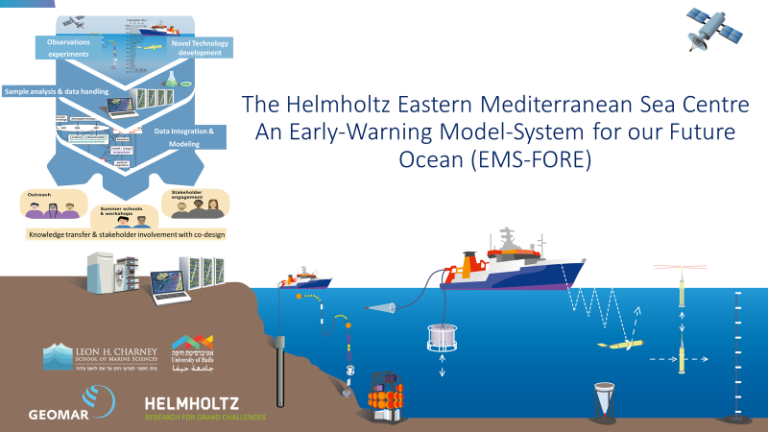
Partnership between U of Haifa and GEOMAR Helmholtz Centre for Ocean Research Kiel
Human activities including climate change are altering our oceans. Climate model projections suggest that warming enhances surface ocean stratification and diminishes nutrient supply to the euphotic zone, thereby altering the structure and functioning of marine ecosystems whilst decreasing carbon export production. Increased intensity and frequency of extreme events (droughts, floods, surface ocean heating) have unknown consequences for biogeochemical and ecosystem processes. Further, warming of subsurface waters decreases oxygen levels and affects sinking organic matter fluxes, composition and degradation rates, whilst destabilising sub-seafloor methane hydrates.
Questions arise whether the oceans can maintain their current productivity and biodiversity, and continue to supply critical ecosystem services including the provision of food and CO2 uptake? Can marine ecosystems adapt, or are these ecosystem-service capacities decreasing?

We have created a partnership between GEOMAR Helmholtz Centre for Ocean Research Kiel and the University of Haifa to establish the Helmholtz International Laboratory in the Eastern Mediterranean Sea as a model for Future Ocean Research (EMS FORE). The Eastern Mediterranean Sea is one of the most rapidly changing ocean basins on our planet impacted by both climate change and extensive human pressures.
The International Helmholtz Lab EMS-FORE, based in Haifa, combines GEOMAR’s unique experience in investigating processes in global oceans with Haifa’s in-depth insights of the functioning of the Eastern Mediterranean Sea. The 6 million€ project will start in January 2022 for a period of 5 years, is led by Prof Eric Achterberg (GEOMAR) and Prof. Ilana Berman-Frank (U.of Haifa), with a core team of ~25 researchers and students. EMS FORE will study the impacts of climate change, and the resilience and sensitivity of the Mediterranean Sea as an early-warning and model system that can inform us about future conditions in sub-tropical oceans worldwide, which cover ca. 40% of our global ocean.
We will use world-class facilities, a range of advanced technologies for ocean observations, experimental manipulations, research vessels, long-term moorings and deployments of underwater vehicles, novel cameras and chemical sensors, and marine ecosystem models to integrate the data and predict future oceanic responses. Multidisciplinary marine research will examine seafloor processes and sedimentary records to inform about the past, water column processes to tell us what is presently occurring, and modeling will be developed to examine what the future will look like for the Mediterranean Sea and the global oceans.


